THIS CRAZY DAY IN 1972: Monster Truck Edition
Weekly Compilation April 3-9, 1972
To access all contents, click HERE.
Why do we run this separate item peeking into newspapers from 1972? Because 1972 was part of the ancient times when everybody read a paper. Everybody, everybody, everybody. Even kids. So Steve Bertolucci, the 10-year-old hero of the novel serialized at this Substack, read the paper too—sometimes just to have something to do. These are some of the stories he read. If you’d like, keep up with the 1972 papers every day on Twitter, @RoselandChi1972.
This is the Monster Truck Edition because it was a monster of a week in 1972—hitting all ‘72 cylinders.
April 3, 1972
Chicago Daily News: Boy shot by truck driver dies
Chicago Tribune: Driver Suspended in shooting
By Barry Fletcher
An armored truck driver shot a 10-year-old boy on Saturday afternoon in a Jewel grocery store parking lot, then at 3132 N. Sheffield, just down the street from the Vic Theater. Early Monday, the boy died. The driver was charged with voluntary manslaughter.
David Munoz died early Monday morning at Illinois Masonic Hospital. Driver Donald Brannan of 1739 W. Barry, 26, “burst into tears” in court. Brannan refused to make a statement to police.
David Munoz was one of five children in his family. The Munoz family lived at 850 W. Fletcher, which is a little west of Clark.
“It would be premature to say what prompted our driver to pull his gun,” Armored Express president Robert J. Wilson told the Daily News. “I think something provoked our driver to become alarmed. But how could a 10-year-old child alarm him?....I’m sure our driver had no intention of shooting this boy. Our driver has two young children of his own and was so upset over the shooting we haven’t been able to question him.”
“Wilson added that his firm was ‘very, very sorry about the incident, and we’re going to assist the boy’s family in any way we can.’”
Police say Brannan was alone in the truck as his partner entered Jewel, and he fired through “a gun porthole” in the truck. William Keating, commander of the homicide unit, said David Munoz was carrying groceries to cars for tips. He was wheeling a shopping cart back into the store when Brannan shot him.
“The fatal shot struck the boy in the left chest, piercing his lung. However, the boy was able to get up and run into the store, where he collapsed near a checkout counter after saying: ‘I’ve been shot from the truck.’ Shoppers and store clerks said they at first thought the boy was fooling, but then saw blood on his jacket.”
Yesterday’s Tribune account of the fatal shooting included this information, and quoted David’s mother, Mrs. Margaret Munoz, who told reporter Frank Blatchford that David had asked if he could help carry groceries at the store.
“I don’t really know what happened. The police haven’t told me yet,” Mrs. Munoz said while David was still in surgery.
In today’s Trib story, which would have gone to print before news of David’s death, reporter Blatchford speaks with Armored Express vice-president Carl Freyman. Freyman said it was Brannan’s job as the driver to stay in the truck, and be responsible for the safety of the truck and his partner, who enters stores to bring back the money.
At that point in the afternoon, according to Freyman, “they’d have a pretty good load [of money on the truck.] When people start climbing on the truck or walking toward it, it unnerves them.” (Note: Accounts to come will mention that a group of teenagers had initially surrounded the truck and jostled Brannan’s partner as he entered the Jewel.)
14-year-old Wayne Adams gives the Tribune what will be one of several conflicting eyewitness accounts. Adams says he was playing basketball in an empty lot nearby:
“The little boy was playing around the truck, and he [the guard] stuck a gun out the window and shot him. The kid was just playing around the truck by himself.” Afterward, said Adams, Brannan “stuck his head out the window and said [to Munoz], ‘Hey, kid. Come here.’”
April 3, 1972
Chicago Daily Defender: Gwendolyn Brooks in free poetry reading
“Gwendolyn Brooks, poet laureate of the state of Illinois, will read from her own works at The University of Chicago Wednesday evening, April 5.
“The Pulitzer Prize-winning poet will appear at 8. p.m. in Breasted Hall of the University’s Oriental institute, 1155 E. 58th St.”
…. “Miss Brooks was born in Topeka, Kan. but has spent most of her life in Chicago. A graduate of Wilson Junior College, she is author of ‘A Street In Bronzeville,’ ‘Annie Allen,’ ‘Maud Martha’ (a novel), ‘In the Mecca,’…and ‘Jump Bad,’ an anthology of the new Chicago writings.
…. “Miss Brooks has also invested her status as a major writer in helping to build black publishing houses, her chief publisher today being the Broadside Press, founded and directed by Dudley Randall in Detroit.”
April 3, 1972
Chicago Today: National Super Markets two-page ad spread
Americans are obsessed with inflation right now, especially at the grocery store. These kind of ads appear in the papers every day.
April 3, 1972
Chicago Daily News: Daley, CAP leader clash over bond issue
by Jay McMullen
Get ready for some vintage Mayor Daley.
The new Illinois Constitution lets Chicago pass bond issues up to 3% of assessed property valuation without voter approval, but the City Council needs to pass its own legislation putting that in place. And of course they’re about to do so. The Council will vote this week on an ordinance to allow the city to issue up to $360 million in general obligation bonds, just about the legal limit.
The Citizens Action Program (CAP) is a very active community group at this time, prominent in the movement against Mayor Daley’s Crosstown Expressway. So not Mayor Daley’s favorite people.
CAP leader Father Leonard Dubi meets with Daley in front of reporters in Daley’s City Hall conference room and accuses the mayor of trying to “ramrod a bond program down the taxpayers’ throats without a referendum.”
Mayor Daley is unruffled. “Unfortunately, many times in government you and others do not know what’s going on,” he says.
“Under questioning by Daley, Father Dubi admitted he had read only a summary of the proposed ordinance, and not the text of the entire ordinance”.
Father Dubi also didn’t know that he’d missed the Finance Committee hearings on the ordinance last week. But as any Council watcher knows, an ordinance goes through committee hearings before it reaches the Council floor for a full vote. Father Dubi later said the Finance Committee meetings were “obviously shrouded in secrecy.”
NOTE: It’s certainly not beyond Ald. Tom Keane, Finance Committee chair and Mayor Daley’s righthand man, to keep a lid on it as best he could, though the committee agenda would be public. However, the Civic Federation knew about this ordinance and actually approved of it, in order to set an orderly procedure for passing bond issues. If the Civic Federation knew, all other independent community organizations would likely have known too, if they were paying attention to the issue.
“ ‘I’m shocked at you,’ Daley said softly. ‘What kind of priest are you to tell me you are now talking about something you have never read?’”
Note: Other than Mike Royko, the papers generally still clean up Mayor Daley’s utterances. He may not have been quite so grammatically correct.
“Daley ended the confrontation by walking out of the conference room, despite the shouts of Ray Kaepplinger, another CAP leader, who said: ‘Hey! Come back here! You can’t walk out on us!’”
Have to hand it to reporter Jay McMullen—future husband of future Mayor Jane Byrne. Those were some nice touches of dialogue he added to this piece.
Do you dig the Wrigley Building? It’s got some very cool history. Check out the Optional History Chapter here.
April 3, 1972
Chicago Daily News: Quarter page ad for The Mike Douglas Show
Mike Douglas moving from Channel 9 to Channel 5—this was a very big deal.
Mike Douglas was a Big Band singer put out of business by rock ‘n roll. He segued into television and eventually his own popular nationally-syndicated talk show. I see on Wikipedia that Douglas’s show was initially live until “guest Zsa Zsa Gabor used the phrase ‘son of a bitch’ when referring to stand-up comedian and comic actor Morey Amsterdam of the Dick Van Dyke Show” in 1965.
What? Who doesn’t like Buddy? Hilarious to think the real Morey Amsterday may have been an SOB. I don’t have time to look into that right now. Sadly, this episode does not come up on YouTube.
For a middle-aged, middle-of-the-road talkshow host firmly rooted in Middle America, Mike Douglas saw an unusual amount of action on his show. I’d go so far as to say that the Mike Douglas Show, in its way, is as good a history lesson of the times as Dick Cavett, if less brainy.
Most famously, John Lennon and Yoko Ono co-hosted the show with Mike for an entire week in—of course—1972. That was Feb. 14-18. Somehow I missed any Chicago coverage of it at the time, and this is my first excuse to mention it. Lennon and Ono picked half the guests, including Black Panther Bobby Seale and George Carlin.
Here’s an article on the Lennon-Ono week with a link, and here’s the YouTube search page with a mess of clips, including a Lennon performance with Chuck Berry. As Mike notes during a joint introduction with Lennon, this was the first time Lennon ever met Chuck Berry, even though Berry was one of the Beatles’ heroes.
In the first half of this approximately 7-minute clip, they sing “Memphis Tennessee” together. Yoko plays a bongo. Second half, they come back and do “Johnny B. Goode.” There is a minimum of Yoko screaming, in case you’re hesitating.
It warms your heart to see Lennon and Berry sing the refrain together.
April 3, 1972
Chicago Daily News: Daley wins sixth term as county Dem chief
by Jay McMullen and Tony Fuller
April 4, 1972
Chicago Sun-Times: Dems whoop it up, re-elect Daley
by John Dreiske
The accounts of Mayor Daley getting re-elected for the sixth time as the head of the Cook County Democratic Central Committee—the Machine, in common Chicago tongue—sounds more like a crazy ‘70s cult than a political meeting. But then, no reason it couldn’t be both.
Some excerpts from the speeches by Mayor Daley’s followers:
Ald. Tom Keane, powerful chairman of the City Council Finance Committee and Mayor Daley’s righthand man: “His chairmanship is noted for unassailable integrity, fairness of judgement, a deep understanding of metropolitan government, an intimate knowledge of local government and constant consultation with his fellow committeemen.”
Ald. Claude Holman (4th): “As the song says, ‘Lead kindly light,’ he leads us. There is no other person who can take his place. He should keep on and on and on.” Ald. Holman has turned up quite often in TCD and Mike Royko. See here, where Mike calls him “one of the city’s truly bizarre political creatures.”
U.S. Rep. Roman Pucinski: “This chairman has made democracy work.” Pucinski got the Democratic nomination to run against incumbent U.S. Senator Charles Percy in the upcoming general election, which is hopeless. Here’s Pucinski pandering to Irish voters in an article by long-time Reader media critic Mike Miner when he was a Sun-times reporter.
4th Ward Committeeman Marshall Korshak: “He cares about the people of Chicago. He exemplifies the best in human kindness.”
A few “dissident Democrats made a weak and unsuccessful parliamentary protest,” writes the Daily News. “Chairman Daley, in his acceptance speech to the committee members in the Sherman House Hotel, took note of those who challenged his re-election.”
“‘It’s easy to criticize me and men and women. This is a natural virtue. But you don’t get mad….We have a great party. We must get together for this difficult election. Life is too short, it goes by too soon.”
The Sun-Times’ Drieske says the party faithful shouted themselves hoarse “in a series of standing ovations”. Further:
“After slickly and quickly re-electing Daley chairman and 26th Ward Commiteeman Matthew W. Bieszczat as secretary, the Mayor turned the meeting over to a quartet of dissenters…led by Committeeman Seymour Simon (40th).”
Bieszczat is one of Mayor Daley’s closest confidants. Under the December 6 item here in Mike Royko, see Mike’s hilarious description of Bieszczat grilling then-Illinois Lieutenant Governor Paul Simon when he appeared before the Machine slate committee to get their endorsement for the Democratic gubernatorial nomination.
Lead dissenter Ald. Simon was in his second stint in the City Council in 1972, after running afoul of Mayor Daley as Cook County Board President and turning if only by necessity into an independent Democrat. As TCD readers may remember, Ald. Simon consequently has a hard time getting city services in his ward. See here and especially here, where Ald. Simon had to go to the Daily News’ public service column, Bee Line, to get an alley fixed.
Per the Sun-Times, the dissenters “held fourth for two hours after the essential business of the day had been completed.” That description is rather different than the Daily News’ brisk brush-off of a “weak” protest. In the end, it’s true, it made no difference. But what a show it must have been. Get this, again from the Sun-Times’ Drieske:
“As Daley sat beside them contributing retorts to their charges the Daley organization is seriously weakened, the dissenters cited the victories of two non- organization candidates, State’s Atty. Edward V. Hanrahan for the state’s attorney nomination and Daniel Walker for the nomination for governor.”
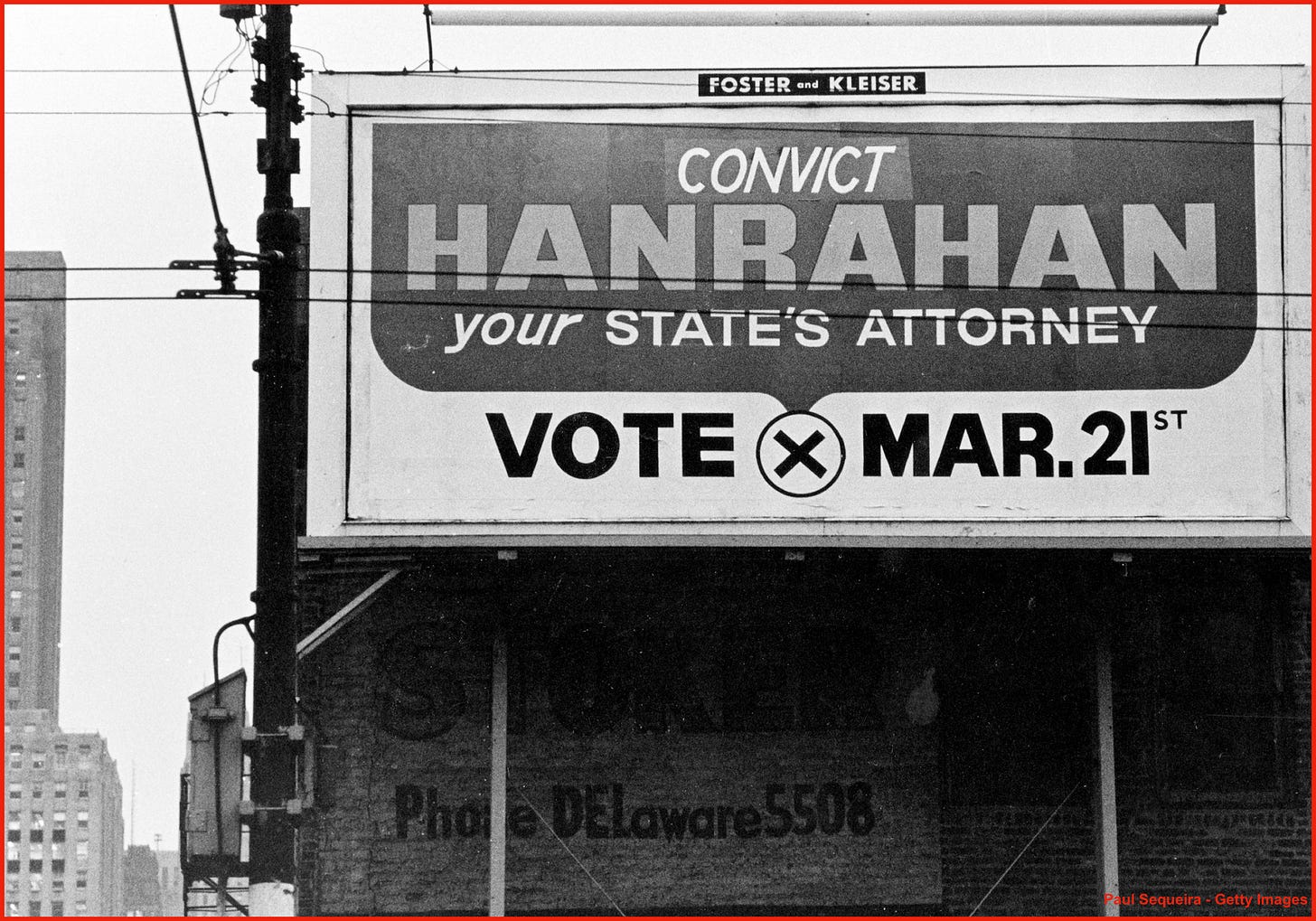
Drieske writes that in his own speech, Daley had “attacked jeeringly those ‘people who are dancing in glee believing that this organization is disintegrating. Nothing could be further from the truth,’ Daley shouted and he predicted victory for both the Democratic state and Cook County tickets, asserting, ‘I shall do the best I can.’”
Mayor Daley went on as if Mike Royko had written his speech, admitting there were “probably” mistakes: “We are an organization of individuals and no one is perfect. Those who would criticize us here had better appraise themselves.”
For the first time ever, Daley opened this meeting to the press. He never mentioned Hanrahan or Walker, who were both out of town on vacation.
April 4, 1972
Chicago Today: Guard charged in boy’s slaying
By John McHugh
“The fatal shooting of 10-year-old David Munoz by an armored truck driver sent shock waves thru the Puerto Rican community here according to a Puerto Rican leader.”
Driver Ronald Brannan “blurted out that the shooting had been an ‘accident’ when police arrived, according to Kenneth Brakebill, a 15-year-old Lake View High School freshman who said he was walking across the Jewel parking lot when the shot rang out.
“ ‘I didn’t mean it,’ Brakebill quoted Brannan.”
“The slain boy was a regular around the Jewel lot where he helped shoppers carry groceries to their autos for small change….Meanwhile, Armored Express officials were at a loss to explain why anybody locked inside the cab of an almost-impregnable armored truck would feel compelled to fire a shot thru a gun porthole.”
“ ‘Apparently our driver thought he was in trouble. He must have been brandishing his pistol and it accidentally went off,’” said Armored Express president Robert J. Wilson.
April 4, 1972
Chicago Sun-Times: Armored car guard’s story: Drew pistol to scare off teens
Tom Fitzpatrick “Fitz” column
Sun-Times columnist Tom Fitzpatrick sheds a more human light on the terrible death of 10-year-old David Munoz, fatally shot by armored truck driver Ronald Brannan on Saturday.
Fitz runs across across Brannan’s young wife as he covers the story:
“Mrs. Judy Brannan, 21, sat on a wooden bench across from the bonding desk on the first floor of the Central Police Headquarters at 11th and State Monday afternoon. She was frightened,” writes Fitz.
“My husband is a 26-year-old man, and he’s been crying ever since it happened,” Judy Brannan tells Fitz, a reporter who’s approached her on what must be the worst day of her life. “All he can do is cry. We have two little children ourselves. How can anyone think he would do a thing like this and it wouldn’t be an accident?”
Now Fitz tells us the story he’s heard from Armored Express president Robert J. Wilson, who’s spoken to Brannan. Nobody else has heard this, because Brannan on advice of his lawyer won’t talk to the police. Judy Brannan confirms this story.
“Brannan told his boss and his wife that a large group of teen-agers surrounded the truck and jostled his partner as he walked toward the store,” writes Fitz.
Wilson tells Fitz that teenagers harass the drivers a lot--climbing on the fenders and sometimes even walking on the truck roofs.
“Two of these teens even followed Brannan’s partner into the store,” says Wilson. “Now that isn’t really all that bad, but Brannan decided he’d better do something to warn the teen-agers away from the truck. He removed his pistol from its holster and pushed it through a porthole.”
And when he pushed his gun through that porthole, Brannan told his boss, the gun accidentally went off.
“‘The boy was not involved at all,’ Wilson said, ‘and Brannan told me he didn’t even see him before the gun discharged….The sum of it is that he tried to scare those teen-agers off and a kid who had absolutely nothing to do with anything was hurt.’”
Wilson plans to pay all David Munoz’s funeral expenses.
Fitz finishes his column describing Ronald Brannan’s release after his wife posted $500 for his $5,000 bond. Brannan emerges at the end of a hall, sees the waiting reporters and photographers, and blanches.
“I don’t want to go down there,” he says. “I don’t want them taking my picture.”
But Brannan has to sign his bond. He takes off his coat and throws it over his entire head, so he “could walk only if led by his wife and the vice-president” of his company, who had come to help pay the bond. They led Brannan outside and down the steps.
“He stumbled once or twice, but he finally made it out of the building and across State Street and into a car waiting in a parking lot.”
NOTE: So far I haven’t seen a feature story on David Munoz, which today we would expect to see immediately. Trib digital archives don’t show one coming up in that paper. If one shows up in another paper, I’ll include in future posts.
April 4, 1972
Chicago Daily News, page 3
Actually, this one also qualifies for the cheesecake logo.
April 4, 1972
Chicago Today: Stealing--a national sickness
Jack Mabley column
Jack sees a greedy, nihilistic mindset creeping across America. He pinpoints the source in the lede: Abbie Hoffman.
“Abbie Hoffman started it with ‘Steal This Book,’” writes Jack. “So many people did, few stores would carry the book.”
“It wasn’t very subtle,” Jack writes of Hoffman’s book. “Lie to get food stamps, get on welfare in several states simultaneously, wear heavy clothing to conceal food stolen in supermarkets. Hoffman’s rationale was that the big mucks of the Establishment lie and steal and cheat, so why shouldn’t the little guy, and here’s how Abbie does it.”
Jack is on his way to excoriating the April 1972 issue of the liberal Ramparts Magazine, which features the article “How to Cheat on Your Income Tax: A Guide.”
“These books and articles are clumsy, unimaginative and dangerous,” Jack writes. “But if you’re caught walking past the checkout counter with a canned ham under your coat…Abbie Hoffman won’t be at the cell door with your bond.”
….“I’ve been in the news business so long and seen so many cheaters caught that I think it’s plain stupid to cheat or steal, any time, any place, at any level. People who don’t get caught rarely spend a peaceful day.”
“But I think we’re going to see more of these ‘How To…’ books because they reflect a terrible disenchantment among the young….It’s not the outright stealing that infuriates and disillusions the young, but the manipulation, the shading of truth, the concealment of fact, the buying of favors, the finagling at the top level. It is a national sickness, and the symptoms are spreading.”
Plenty of readers then and now would agree with Jack Mabley—because really, aren’t there always a fair percentage of successful people, politicians and bureaucrats who cheated to get ahead? And aren’t young people always disillusioned to realize it?
The reason I included this particular Mabley column is because Jack included Mike Royko among the list of bad influences, without naming him. Jack sees Mike’s hilarious March 16 column as part of the pernicious trend that began with Abbie Hoffman.
On March 16, Mike addressed a reader’s question to the Daily News’ financial columnist. The reader asked how to hide income in order to fraudulently qualify for public housing. The financial columnist had refused to answer, but Mike ran with that ball:
“All up and down La Salle St., you can find experts and specialists who will provide sound, reliable advice on how to cheat at almost anything,” Mike wrote “However, their services come high. The average person can’t afford them….Thus he is deprived of good, sound advice on how to cheat.”
Mike probably would have been surprised to find out he was echoing Abbie Hoffman, however unintentionally.
Mike’s column imagined the string of events that would follow if the average person could make money by cheating, which ended by eliminating all crime and making everyone better off. At the end, Mike offered to answer similar questions for common people in the future.
Jack missed even a glint of humor in that column. As he put it, “A columnist on a major metropolitan newspaper recently announced he is going to provide a service for little guys on how to cheat.”
This week at least, Mike didn’t take the bait and reply, with or without naming Jack Mabley. We’ll see if refers to Jack in future.
This Mabley column certainly implies Jack and Mike did not have a good relationship, though I don’t actually know that. Recall that Mabley left the Daily News for the Herald-American, which became Chicago’s American, which turned into Chicago Today. Mabley’s move opened up space at the Daily News for a new columnist, which turned out to be Mike Royko. Royko quickly became the city’s supernova columnist, blotting out all the smaller stars in the Chicago newspaper galaxy. If Mabley found that annoying, you probably couldn’t blame him.
Which reminds me—if you’re a regular THIS CRAZY DAY reader, you’ll probably want to follow Mike Royko 50 Years Ago Today too.
April 4, 1972
Chicago Sun-Times: Owners reject player settlement
By Jerome Holtzman
Holtzman writes that the baseball team owners “in a sudden and startling development” rejected a proposal from the striking major league baseball players.
Opening day is definitely off.
“All 24 major league club owners and their general managers are now on their way to Chicago for an emergency meeting scheduled for 6 p.m. Tuesday at the O’Hare Marriott. A big intramural skirmish among the owners can be expected since at least a half dozen of the owners are believed to be eager for a settlement.”
John Gaherin, the owners’ negotiator, says he was always afraid that if a strike got started, “it would be like a snowball running downhill.”
The Sun-Times’ Holtzman sounds surprised by the owners’ rejection. He writes that Marvin Miller, the executive director of the Player’s Association, had modified the players’ proposal for a settlement “that wouldn’t have cost the owners a cent beyond their original offer of a $490,000 increase in the players pension fun,” in exchange for a provision “that the players would also be entitled to use the estimated $1 million surplus in the pension fund for the sole purpose of increasing pension benefits.”
Holtzman says that might have been “an ideal solution” that even St. Louis Cardinals owner Gussie Busch might have accepted, even though Busch said two weeks ago,“We’re not going to give them another damn cent.”

But Gaherin says the owners’ actuarial advisors have advised it would be “imprudent” not to continue using the surplus money to pre-pay pension liabilities.
The Players’ Association’s Miller says he’ll “acquaint the players that the owners are insistent that the players bend down and kiss the shoes of the owners.”
April 5, 1972
Chicago Daily News: Guard fired, won’t explain boy’s death
By Barry Felcher
Armored Express fired driver Ronald Brannan, 26, after he refused to give a written explanation of the events that led to his fatal shooting of 10-year-old David Munoz outside a North Side Jewel store.
“I’m certain that his actions were absolutely accidental. But the fact remains that the (boy’s) death came through improper and negligent use of a firearm by Brannan,” said Armored Express president Robert J. Wilson.
April 5, 1972
Chicago Sun-Times: Talk-show recipe timed to the minute
Ron Powers TV column
Sun-Times TV critic Ron Powers has had it with formulaic TV talk shows that cut off conversation with a commercial any time things actually get interesting.
“Somewhere, I am convinced--possibly in Kankankee--there is a secret company that manufactures Instant TV Talk Show Kits. These kits (which, something tells me, resemble little boxes of Betty Crocker angel-food cake mix) are sent out to the producers of such programs as Kennedy & Co., Kennedy at Night, and Sunday in Chicago.
“Along with certain basic ingredients--some makeup mix, a little hair spray, a modicum of judgement, a grain of salt--the kits probably include a list of Famous Talk Show Recipes.
“By following the simple instructions inside the package (my theory goes), the producer can delight his station managers and viewers alike with an eye-tempting array of easy-to-fix talk shows that are a breeze to prepare, yet have that down-deep ‘home-produced’ goodness that folks used to enjoy back in Dave Garroway’s day.”
Ron Powers is after my own heart, going by his list of typical guests included in the talk show kit. They include “One (1) Recent Hijacking Victim” with a specified three minutes of screen time. Also, and this will figure in later in this Powers column, “Two (2) Bizzare Animals garnished with One (1) Trainer” for “6 minutes, or until animals attack host”.
Powers developed his theory due to the “apparently ironclad scheduling of the time segments” on local Chicago talk shows. Guests are “Yanked out of sight with the inexorable efficiency that must have governed vaudeville in the days of Mama Bologna and her Barking Schnausers.”
It doesn’t matter, writes Powers, if guests are finally getting to something newsworthy. And here’s his example, which THIS CRAZY DAY readers will wish they’d seen:
“One egregious example occurred a few weeks back on Kennedy & Co. (Ch. 7). Stanley Kusper Jr., chairman of the Chicago Board of Election Commissioners, and Marshall Patner, a citizen-interest lawyer who had been feuding with him over the nominating petitions for state’s attorney candidate Raymond Berg, finally came face-to-face on the show. Just as their debate was beginning to shed some real light on the issues surrounding the nominating process in Cook County, somebody waved a magic wand and the two were whisked off the air to make room for Kennedy parading a 300-pound Bermuda tiger.”
April 5, 1972
Chicago Sun-Times: TV’s Johnny Carson files to dissolve marriage
UPI
Johnny Carson filed for divorce from his second wife, Joanne Carson, after eight years.
“Carson is scheduled to move his popular tonight show from New York to Hollywood permanently May 1.”
Yes, that should be “Tonight Show.” Perhaps some copy editor at the Sun-Times got an earful on that one.
April 5, 1972
Chicago Sun-Times: U.S. judge backs longhairs’ rights
UPI
U.S. District Court Judge Robert Shaw “issued a firm warning” to New Jersey police during a hearing for an ACLU lawsuit “charging state police make a practice of illegally searching the cars of long-haired motorists.”
Judge Shaw earlier heard testimony from Ronald Greenblatt, 22, a Rutgers student with long hair and a beard who played Jesus Christ in a CBS documentary. Greenblatt was stopped by Jersey police multiple times. Each time, cops searched his car for drugs, but never found anything.
Separately, four Jersey state troopers were suspended for allegedly attacking two long-haired Jersey “youths.”
“I’ve been noting some disturbing stories in the press,” Judge Shaw told his courtroom. “I suggest that some degree of restraint be exercised. State police should understand that they do not have the power to threaten or punish.”
April 5, 1972
Chicago Daily News: Joshua Taylor walks again
by Phillip J. O’Connor
“Joshua Taylor Jr., 14, took what were probably the 12 most important steps of his life as his mother and his hero, Chicago Bears halfback Gale Sayers, watched enthralled.
“Joshua, who was virtually paralyzed from the waist down by a sniper’s bullet Dec. 7, fixed his face determinedly as he pulled himself out of his wheelchair.
“Then, using crutches to brace himself, he slowly took one step—and then another. His face was a portrait of determination.
“Sayers quietly encouraged the boy, walking by his side. Joshua’s mother smiled.”
Joshua walked after appearing with Sayers on the “Harambee 26” show on Channel 26, which airs 3-4:30 p.m. weekdays and features Sayers doing interviews.
“He’s a fighter. He’s really fighting. That kid is something else,” said Sayers.
“I know I’m going to make it,” said Joshua.
Joshua is one of six kids. His dad is a cab driver, and the family lives in Cabrini-Green—where Joshua was shot by a sniper in a high-rise as he walked to Sexton School at 160 W. Wendell, after lunch on December 7, 1971.
Police are still looking for four youths who are suspects in the shooting.
Gale Sayers has visited Joshua from the start, first at Henrotin Hospital and later the Chicago Rehabilitation Institute. Sayers is a “special consultant” for the Daily News “carrier boys program,” and Joshua was a Daily News paperboy.
One of Joshua’s route customers, John E. Sullivan, district manager of Cathay Pacific Airways at 333 N. Michigan, set up a Joshua Taylor Fund at National Boulevard Bank. The fund has raised about $3,500 so far.
I’m always pointing readers to Chapter One and the current latest chapter. Chapter Two, in which we meet our hero Steve Bertolucci and his office colleagues in 2003, is beginning to feel like a middle child.
So let’s not forget the four parts of Chapter Two: “Dawn creeps west up the Chicago River,” “Cheeseheads and FIPs,” “Meet Eddie Rose, that fuckstick,” and “Heeeere’s Johnny!”
April 5, 1972
Chicago Daily News: Lawlor-Langford ‘honeymoon’ over
by Jay McMullen
April 6, 1972
Chicago Today: Angry Anna’s not so keen on Keane
by Michael Hirsley
Since the Daily News and Chicago Today are both afternoon papers, it’s odd that the story of Ald. Anna Langford (16th) and Ald. (Father) Francis Lawlor (15th) fighting on the City Council floor appears a day late in Today. But I checked the dates. Maybe it was a deadline thing.
Jay McMullen, future husband of future Mayor Jane Byrne, got the first crack at this story in the News. McMullen writes that the “honeymoon” between Langford and Lawlor, who represent adjoining wards on the rapidly racially changing Southwest Side, blew up in a shouting match on the Council floor about integration.
Ald. Langford, a Black lawyer, called Father Lawlor, a white priest, a hypocrite. “He in turn accused Mrs. Langford, an attorney, of closing all the deals for houses sold to blacks in the white areas of the Southwest Side.”
“Ald. Thomas E. Keane (31st), the administration’s floor leader, signaled the end of the ‘honeymoon’ by raising both hands as a pastor before his flock and saying, ‘The marriage is hereby dissolved.’”
Langford and Lawlor had a spat during a Council meeting last year, writes McMullen, but “embraced afterward” and have been holding meetings to work on the racial problems in their wards. But at this week’s Council meeting, Father Lawlor tried to delay approval of $83 million in notes for the Board of Education.
“Father Lawlor renewed his charges that the Board of Education’s policies were causing integrated schools on the Southwest Side to become all black. He said that the board was building additions to integrated schools instead of building them at all-black schools where he contended they were needed. As a result, ‘the gangs are moving in,’ congestion and racial tension are increasing, and ‘thousands of whites are moving out’ of the white neighborhoods, he said.
“‘Black people are moving in and taking over every single home, our schools, our churches,’ he said. ‘Black people need a place to live, but so do we.’”
“Mrs. Langford, who sits next to Father Lawlor on the Council floor, interrupted, repeating ‘Black doesn’t rub off, black doesn’t rub off.’ She also charged that they (whites) burn down the houses in retaliation (for blacks moving in.)’”
“‘Whoever burns them down has the responsibility to pay for it in the sight of God,’ Father Lawlor responded.”
Chicago Today’s Michael Hirsley reports that Ald. Langford was none too pleased with Ald. Keane’s honeymoon quip.
“Ald. Keane is too intelligent a man to have used that expression, and used that opportunity to belittle aldermen for trying to make something purposeful out of the council,’” she said.
Ald. Langford told Hirsley that her meetings with Father Lawlor didn’t work out. “His goal is to keep blacks out of his community. Mine is to integrate peacefully.”
“Lawlor went to Mrs. Langford’s office in City Hall after the stormy session yesterday,” writes Hirsley. “He agreed that the two have been unable to work out their differences. ‘When I’d mention crime or violence, she’d blow up,’ he said. She said, ‘I appreciate the fact that he came to me. I wouldn’t have gone to him after that meeting.’”
During the Council meeting, Hirsley reports that Lawlor said the Board of Education’s policies of changing school boundaries was “resegregating” schools rather than integrating them, because it caused whites to move out. Langford said that Lawlor talks about Blacks “as if we were some kind of plague”.
Hirsley says observers who think Lawlor and Langford embraced and kissed last year are wrong. He may be referring to McMullen’s Daily News article.
“It was Ald. [Claude W.B.] Holman, and he kissed me. I didn’t kiss him,” Langford explained.
“Lawlor said such an act ‘doesn’t fit in with my clerical beliefs.’”
April 6: The Mighty IC
Chicago Daily News & Tribune: Rep. Scariano on the IC rate increase
Last week, the Illinois Commerce Commission (ICC) approved the Illinois Central’s (IC) requested 7% rate increase, and also scheduled a May 9 hearing to investigate the IC’s financial relationship with its parent company, Illinois Central Industries.
As Today’s Robert Glass reported, “The hearing…will stress financial transactions between the two companies, the railroad’s expenditures for service improvement and the sale of part of the railroad’s assets by the parent company.”
But State Rep. Anthony Scariano is calling for an investigation of the ICC’s “cozy relationship” with the IC, and the rate hike approval.
Per the Daily News, Scariano called the fare increase approval “tantamount to the regulated becoming the regulators.” He wants to “try to find out why the profit from the sale of expensive downtown property, including air rights, by the IC are not applied to the railroad’s commuter operations.”
The Trib gives the direct quote: “I am sick and tired of having the Illinois Central get permission to sell valuable tracts of property, including air space rights which are no longer needed for its carrier operations, only to have the proceeds of the sales credited to other than commuter operations.”
Scariano is talking about two downtown areas. First, the IC rail yard on the old Fort Dearborn site on the south bank of the Chicago River, seen below before the IC started selling the air rights…
…and more recently, below. I’ve added an arrow pointing at the original Prudential Building to steady yourself, since the difference is potentially disorienting.
Second, Scariano is talking about the vast IC rail yards extending south beyond Grant Park. The postcard below shows the Illinois Central Station depot circa 1950, just east of Michigan Avenue on 12 Street/Roosevelt—about where Indiana Avenue is today. The IC owns all the land between Michigan Avenue and the eastern edge of its rail yard, and extending south quite a ways—perhaps all the way to 22nd Street?
A more recent view across the south end of Grant Park from Michigan Avenue, thanks to Google Streetview:
And more IC fun!
April 5-6, 1972
Chicago Daily News & Tribune
Mayor Daley’s City Council voted 30-8 to set up procedures to let the city issue general obligation bonds without voter approval until all outstanding bonds equal 3 % of Chicago real estate assessed valuation, about $350 million.
You can guess who voted the 8 “nays,” but includes legendary 5th Ward Ald. Leon Depre, William Cousins (8th), Anna Langford (16th), Seymour Simon (40th), Bill Singer (43rd), Dick Simpson (44th), and lone Council Republican John Hoellen (47th).
“Dissenters contended the measure was a booby-trap, and said it opens the way for big tax increases,” write the Trib’s Edward Schrieber. “Administration aldermen countered that it was just a procedural measure to clear the way for what was authorized by voters when they adopted the new Illinois Constitution.”
But an even bigger debate raged over development of the IC’s property on the old Fort Dearborn site, which in 1972 still looks pretty much like this postcard, with the notable addition of the almost-completed Standard Oil Building.
Mayor Daley’s allies passed five ordinances to “appropriate money for widening and improving streets around the Illinois Central R.R. property east of Michigan Av.”
That includes $1,020,000 for the triple decking of Randolph Street from Michigan Avenue to Lake Shore Drive, $970,000 for extension of Wacker Drive to Lake Shore Drive, and $250,000 for extension of Columbus Drive from Monroe Street to the river,” writes the Trib’s Schrieber.
“Involved are 33 tall buildings under construction or contemplated in the area bounded by the river, Randolph Street, Michigan Avenue, and Lake Shore Drive.”
About $2 million will come out of the city’s take from state motor fuel taxes, per the Trib. That’s nearly $14 million in 2022 money, which still seems light for the planned streets, though state money is also promised to help pay for Wacker Drive.
The Council’s embattled independent faction again fought the good fight.
Ald. Seymour Simon pointed out that the new street infrastructure would allow high-rises on the IC land. “This is not going to make Chicago great, but grotesque,” said Simon.
“Independent Ald. Leon Despres (5th) said the ordinances cleared the way for ‘perhaps the biggest steal in all of Chicago’s history,’” writes McMullen, quoting Despres:
“All of the members of the City Council and the city planner are not going to be remembered for what they did, but for what they gave away, what they spoiled, what they ruined and what they embezzled,” said Despres.
Actually, in 2022 Chicagoans simply accept that you should not be able to see the lake from any point on Michigan Avenue between Randolph and Wacker. Most people traversing the area probably don’t even realize they’re walking on the top layer of three levels of streets.
Mayor Daley’s floor leader and Finance Committee chairman, Ald. Tom Keane, often considered the second most powerful politician in Chicago, says if the area isn’t developed, Chicago will lose jobs to the suburbs, out of reach of Chicago’s Black community—per the Daily News.
Per the Trib, Keane says corporations are moving their headquarters to Chicago from New York because of this kind of development. New York is a “dead stagnant city,” says Keane, while Chicago is the “city of the future.”
April 6, 1972
Chicago Tribune: Flunk That Test and See Bob Smile!
Clarence Peterson TV column
Last time Trib TV critic Clarence Peterson covered Ch. 2 anchorman Bob McBride, we learned that ratings showed Ch. 7 had taken the undisputed lead for local news shows among the three networks—just by a hair, over Ch. 5’s Floyd Kalber.
Ch. 2’s abysmal ratings slide was apparently halted, though, by new anchorman Bob McBride and/or Ch. 2’s crazy over-the-top ad campaign promoting Bob McBride. However, Ch. 2 is still firmly in third place.
Today, Clarence Peterson reviews Ch. 2’s one-hour special tonight, hosted by Bob McBride, on venereal disease—colloquially known as “V.D.” The show’s title appears to be “Can you pass the V.D. Test?”
Peterson explains that Ch. 2’s special is patterned after two recent national network specials, “National Drivers Test” and “National Boat Safety Test,” lighthearted programs in which viewers were supposed to match their knowledge of car or boat safety against a random sampling of fellow Americans onscreen.
The problem is that V.D. is even less lighthearted than car and boat accidents.
“In Chicago last year, there were 37,343 reported cases of gonorrhea and 4,745 cases of syphilis. Many cases are never reported. Other are detected too late,” writes Peterson. Ch. 2 did the special because the public is so ignorant about the rampant V.D.
“And there is Bob McBride, channel 2’s new anchorman, doing his first TV 2 News special, and he is smiling,” writes Peterson. “He is smiling and smiling and smiling. Why is he smiling? Does he know that Mr. Unsuspecting Viewer is probably going to flunk the test?”
…. “Health authorities estimate that the V.D. epidemic is hitting one person in every 30 and that there are approximately 120,000 active cases in the Chicago area right now. McBride relates all that. He is still smiling. Even after he describes the statistics as ‘appalling,’ which indeed they are, he is smiling. In the spirit of the game, he is not visibly appalled.”
….“A doctor…has just come on the screen and told us some of the hideous consequences of untreated syphillis—heart disease, arthritis, blindness, and, says the expert, ‘one in 50 will become insane.’ Back to McBride, still smiling.”
April 7, 1972
Chicago Today: N.H.L. brass tosses Hawks costly curve
by Dan Moulton
“What started out to be a Stanley Cup Playoff quarterfinal-round game between the Black Hawks and Pittsburgh Penguins has turned into ‘The Great Stick Scandal.’”
“It began before the Hawks’ 3-1 victory in the opener Wednesday when Pat Stapleton was forced to abandon the stick he has been using for 10 years.
“And it continued last night at the conclusion of the Hawks’ 3-2 victory. Dennis Hull and the Hawk team each was fined $500 by National Hockey League President Clarence Campbell, and Campbell, Hawk Manager Tommy Ivan, and Coach Billy Reay engaged in a wild shouting match in the corridor outside the officials’ room in the Stadium.”
It seems that when the playoffs started, the NHL instituted a new system where supervisors check players’ sticks before every game and give them a literal stamp of approval. Pat Stapleton had his long-time stick taken away before Wednesday night’s game because it was allegedly 1/8” short of the required height.
Then officials impounded Dennis Hull’s stick in the final minutes of the game, even though it was approved beforehand. Afterwards, Coach Billy Reay claims he was told that Penguins’ coach Red Kelly asked the supervisors to check Hull’s stick—a direct violation of the system’s rules.
The officials claimed the curvature on Dennis Hull’s stick was 3/8” greater than the 1/2” allowed. Since the stick was checked before the game, the supervisor insisted Hull had changed the curvature somehow during the game.
“They can keep fining me if they want to, right down to where I owe $17,500, and then I’ll go home,” Dennis Hull raged. Each player will get a $17,500 bonus if they win the Stanley Cup. “If these guys had any guts they’d check my brother Bobby’s sticks. He invented the curved blade. But you can bet they won’t.”
“They won’t check Bobby’s sticks if they value their safety,” wrote Chicago Today reporter Moulton.
April 7, 1972
Chicago Today: Comments on headlines of our time
Jack Mabley column
“TAX REVOLT FEARED OVER BONDS. The Chicago City Council voted to raise taxes again, and only eight alderman protested.
“The big noise and headlines come when the tax bills are figured and when they arrive. But the assurance that taxes are going up comes when a government votes to buy bonds—i.e., borrow money.
“Chicago aldermen…approved a law to borrow up to $350 million without any vote by the taxpayers….The roll of honor—the aldermen who voted against this tax increase—are Despres (5th), Cousins (8th), Staszcuk (13th), Langford (16th), Simon (40th), Simpson (44th) and Hoellen (47th).”
Note: Actually, in this case, the Council passed an ordinance allowing itself to borrow up to $350 million in bonds without voter approval, putting into Chicago law something now allowed by the then-new Illinois Constitution. The ordinance was actually approved by the Civic Federation, for what that’s worth.
“HAWKS WIN CUP OPENER 3 TO 1. Keith Magnuson was decked by a high stick in the second period. They carted him to the dressing room, wiped away the blood, stitched him up (12 stitches), and 20 minutes later he was in another fight on the ice….The amazing thing is that the 200 stitches in Mag’s face don’t show. Hope the doc did a good job in the latest 12.”
April 7, 1972
Chicago Daily News: Longhairs’ lament
Dear Maxine column
It’s been too long since we checked in with the Daily News’ new advice columnist. Here’s the article where she was introduced under January 14, and here’s an early column of sage advice that you will probably find outrageous in 2022, first item.
But today, Maxine is groovy and right on in any year.
DEAR MAXINE: I am a professional man. Many of my patients are young men who wear their hair long.
Naturally, I never mention the subject of hair, but they often do. They all have the same story. Prospective employers won’t even interview them unless they have their hair cut. They are all out of work.
Foolishly, in a helpful spirit, I told several of them to cut their hair and get a job. They do not want good advice. They only want to be told they are right and the rest of the world is wrong.
These young men are ruining their lives in a useless cause. This troubles me, for I like all of them. How can they be helped? —Dr. M.L., Glen Ellyn
DEAR DOCTOR: Bide your time. It seems to me the hair of the employer group is growing longer while the real job seekers are trimming here and there. In another year or so there may be a meeting of the sideburns. Meanwhile, maintain your professional attitude of neutrality.
April 7, 1972
Chicago Today: Dick Gordon says he’s quitting the Bears
Jeanne Morris column
Dick Gordon becomes a free agent on May 1, writes Jeanne Morris.
“Losing Gordon will be a serious blow to the infant regime of the new head coach, a sour first scene for what The Big One likes to call The Abe Gibron Show.”
Two quotes stand out:
“I don’t want to play with the Bears. I told my agent not to negotiate. I’m not even trying.”
And, in answer to “How long has it been since you held a conversation with George Halas, Sr?”:
“Ah…well…once he said, ‘Nice game, kid.’”
April 7, 1972
Chicago Today: Tonight’s best TV shows
This is a small regular feature on the Chicago Today TV listings page--all the papers do something similar.
Those who watched TV in 1972 may be struck by the idea that Chicago Today thought “The Partridge Family” merited inclusion under the heading “Tonight’s best TV shows”--because we can assume the Chicago Today person who put this together was not under 12.
But Chicago Today is being ironic--because that’s how CT rolls. You’d never read any of these synopses in one of the other papers, which run quick, matter-of-fact, “we can’t believe we have to even acknowledge the existence of something like ‘Gilligan’s Island’” sitcom summaries.
When you read a phrase like “rebellion takes its ugly form” in reference to “The Partridge Family,” you have to figure they may even have Bruce Vilanch doing this item.
For those not alive to watch TV in 1972, this should be…an education.
“7 p.m., channel 5 -- Sanford and Son “Return of the Barracuda.” Junkman Fred is sweet-talking a nurse who smells of rubbing alcohol, and Fred is thinking of marriage. Fred and Lamong [sic] invite women to dinner and before the expected verbal war at the dinner table breaks out, viewers will enjoy Fred’s courtship, as well as a scene in which Lamont and friend Melvin tells Fred, ‘Don’t do it, don’t get married.’”
“7:30 p.m., channel 7--The Partridge Family. ‘Dr. Jekyll and Mr. Partridge.’ [repeat] When the high school coach exhorts his disciples to accept greater responsibility, Keith takes the advice as a mandate. He decides to exercise more responsibilities at home and begins by taking the rest of the kids to art museums and chamber music recitals to upgrade their cultural level. Rebellion takes its ugly form when Danny [Danny Bonaduce] decides to counteract by overloading Keith with domestic responsibilities.”
“8 p.m., channel 7--Room 222. ‘Hi, Dad.’ [repeat] Pete Dixon has a new student dogging his every move and, before he can figure out why, the kid blurts out that he believes Pete is his real father. The situation gets sticky but Dixon’s level-headed coping reaches a sane conclusion.”
“8:30 p.m., channel 7 -- The Odd Couple. ‘A Grave for Felix.’ [repeat] Only Felix and Oscar could become immersed in a situation involving the selection of a gravesite and come up with a funny show. Felix finds what he considers to be the ideal resting place for his eventual departure from ‘this mortal coil,’ but Oscar’s bumbling upsets everything.”
NOTE: Not true, but then Chicago Today could not have anticipated the 1996 HBO series “The High Life,” which ran for one short, glorious, incredible, fantastic, cut-short season. There are only eight episodes. This is a show that I’ll probably die still trying to find in a form I can watch again. We taped it on VHS tapes that eventually wore out and have yearned for the show ever since. I actually know someone who knows someone who was on the show, and tried to get some kind of recording that way, but it never happened.
The episode “Funeral” is as genius as the rest of the series, if not more so, as I remember it. I suppose some strange contractual thing keeps HBO from including it online. It was produced by David Letterman, and created by Adam Resnick.
Checking again as I do intermittently now and presumably for the rest of my life, I see there are now two bits available on Vimeo.
Here’s a promo featuring a short David Letterman intro:
And one complete episode! “Union,” also at Vimeo. Watch this, if only for the beautiful opening credits. Note the union organizer, played by Stephen Mellor. This guy is a genius. He plays a different new character in each episode, each brilliantly.
April 7, 1972
Chicago Today: Even Peabodys fall into line
Bruce Vilanch’s TV Report
No award is “more respected and feared” than the Peabodys, writes Bruce. It’s the only prize not awarded by industry people to industry people. The Peabody comes from the Henry W. Grady School of Journalism at the University of Georgia, “And unless somebody in Georgia is angling for a cushy network job somewhere, the awards can be presumed to be above show business politics.”
Why feared? Because the Peabody is supposed to go to shows “with merit, shows that go beyond the routine. Therefore shows that almost no one watches. Meaning shows that get canceled.”
In the last dozen years, writes Bruce, half the country didn’t see the Peabody winners, “and the other half didn’t know they were on.”
The trade papers, writes Bruce, call the Peabodys “the kiss of death” award.
“Some of that has changed,” Bruce acknowledges. “Last year the Peabody went to Flip Wilson, who has just been renewed after a spectacular season of top-10 ratings, covers of Time and so forth.”
What about this year? “And the show-that-everyone-watched award, this year’s token Flip Wilson, went to—what else?— ‘Brian’s Song,’ television’s most popular single soap opera and, according to the committee, ‘a touching human drama.’”
April 8-9, 1972
Chicago Daily News: Palmer challenged on black racism
Letter to the Editor
“I found columnist Lu Palmer’s article entitled ‘No such thing as a black racist’ the furthest thing from telling it like it is since I heard a member of the John Birch Society say that there is no white racism in the South.
“There is no question that racism in America has been historically the prerogative of the white man from 1619 until the 1960s. But as blacks have obtained some power, some blacks have begun to express their race hatred….
“It is important to recognize that the separation desired by some blacks, which is one form of racism, is a direct result of what blacks have seen and have had done to them by too many whites for too long a period of time…Nor should anyone be so naïve as to believe that the passage of civil rights laws has made the black man fully equal in our society. There is still rampant discrimination in job, educational, and housing opportunities.
“But to say that there is no such thing as black racism is to create a credibility gap between fair-minded blacks and whites. The use of physical violence by some black gangs to drive white residents out of West Side neighborhoods in Chicago is an example of overt black racism. The same physical violence on the part of some black youths to force white kids out of racially changing schools is racism. The teaching of hatred for all whites in some black families is racism.
“All these things the black man has learned from the white man, and while it is understandable to those who know the past it does not make it right.
“To Mr. Palmer, I say that in matters of race relations it is best to be color blind, but not to be blind.”
RALPH SCHULER
Oak Park
April 8-9, 1972
Chicago Daily News: Blacks get realistic about drugs
Lu Palmer column
“Black organizations and many grass roots leaders are taking a hard line against drugs these days,” writes Lu Palmer in his regular weekend column.
Anti-drug resolutions were popular at the recent Black Political Convention in Gary, he writes, and in some places, “hard-nosed blacks…have talked about forming vigilante-type patrols to drive the pusher out of black neighborhoods, even killing them on the spot, if necessary.”
….“It was Malcom X who said ‘the first thing black people must do is free their minds,’” and “blacks have finally come to the realization that dope is an enslaver.”
….“There are many blacks who believe that the flood of drugs into black communities is and has long been a carefully designed conspiracy” by whites who control drug trafficking.
“Law enforcement agencies have not been overzealous in cracking the dope ring which engulfs this nation and many believe this is because the profits are so huge and are so broadly spread around. This is one reason why some ghetto blacks feel they must take matters into their own hands.”
….“Since white America has yet to face the drug problem with total honesty, black America is beginning to face its drug problem on the basis of its most compelling need—survival.
“There is some reason to be optimistic, too, since many young blacks are joining the crusade.”
Don’t miss the latest chapter! In which Steve’s Nonna, a Gately’s doughnut and a Roseland All-Stars Little League hat combine to teach young Steve the heartbreaking truth—that you can’t have everything.
April 8-9, 1972
Chicago Daily News: $500,000 skyjack leap!
Here’s a D.B. Cooper wanna-be who was:
“A cool, bespectacled man armed with a pistol and a grenade pulled off the most expensive hijacking of a domestic jetliner and plunged into the cold night sky late Friday with half a million dollars and a bugged parachute.”
What a lede!
The parachute’s radio signals showed it in the mudflats between Utah Lake and the Provo Airport, where a highway patrolman said the mud was up to eight feet deep. FBI agents, deputies and dogs converged on the area. There were rumors that a helicopter had been seen, maybe there to pick up the hijacker, who bought his plane ticket under the name “T. Johnson.”
Remember, you can still get on a plane without even showing an ID.
An off-duty stewardess on the initial flight, Sandra Wilkinson, said the hijacker was calm and cool, sending orders to the captain via notes passed by the stewardesses. “She said she did not see the pistol or grenade but was told that the hijacker sent a grenade pin to the cockpit in an envelope.”
The hijacker was white, about 40, medium build, and wore a wig and a fake mustache. The flight was Denver-Los Angeles. “‘I saw him open a bag he had and take out a hand grenade and put it in his pocket,’ said Joseph Zaleski, a passenger sitting across the aisle from the hijacker. ‘My heart jumped.’”
“T. Johnson” forced the plane to San Francisco first to pick up the $500,000, where he let the passengers get off. After taking off again, the United Airlines flight landed in Salt Lake City after Johnson donned a jumpsuit he’d brought for the occasion and jumped out of the plane.
April 9, 1972
Chicago Tribune: ‘Ten Commandments’ - miraculous longevity
by Gene Siskel
“I don’t know what came over me, but last week I just had to see the Red Sea part,” starts Gene Siskel in reviewing this movie that came out originally in 1956. It’s back, playing at the cavernous Roosevelt Theater downtown. Steve’s Nona takes him to see it, and Steve is as impressed as Gene Siskel was when a 10-year-old Siskel saw the movie for the first time.
Siskel remembers seeing “The Ten Commandments” 16 years earlier with his whole family, at the “Madison Street Mecca, the McVickers Theater, where the gospel according to DeMille was playing.”
Back then, Siskel recalls, Jewish boys argued with Christian boys in his neighborhood about who was greater, Jesus or Moses.
“Back in the present, as the Roosevelt’s house lights dimmed, I wondered if the motion picture which had genuinely enthralled me as a 10-year-old would do it again. It most certainly did, but in different ways.”
Siskel wastes some time on the early parts of the movie, then admits, “but let’s face it, you don’t want to know about that—you want to know about the miracles. Do they stand the test of time? Some do and some don’t.”
Thumbs down on the burning bush.
Thumbs sort of up for Yul Brynner’s staff turning into a snake. It’s not much better than the burning bush, but more fun.
“The pillar of fire reduces God to a red and yellow tornado, suggesting that He is some kind of spicy kitchen cleanser.” Thumbs down, I guess. This is a reference to the then-current Ajax liquid cleaner commercial— “Cleans like a white tornado!”
Definite thumbs up: “The parting of the Red Sea, however, is an outright winner. It is topped, in my opinion, only by the water in Pharaoh’s goblet turning to blood as he pours it into the Nile.”
Siskel was also still impressed by God’s fiery finger writing the Ten Commandments on the stone tablets.
“And I can still remember what happened to me nearly 16 years ago when God’s hot finger etched the commandment that thou shalt honor thy father and mother.
“My mother reached across my sister’s lap and poked me in the ribs.”
Siskel’s advice: “Let Cecil light your fire.”
Did you dig spending time in 1972? If you came to THIS CRAZY DAY IN 1972 from social media, you may not know it’s part of the novel being serialized here, one chapter per month: “Roseland, Chicago: 1972” —FREE. It’s the story of Steve Bertolucci, 10-year-old Roselander in 1972, and what becomes of him. Check it out here.




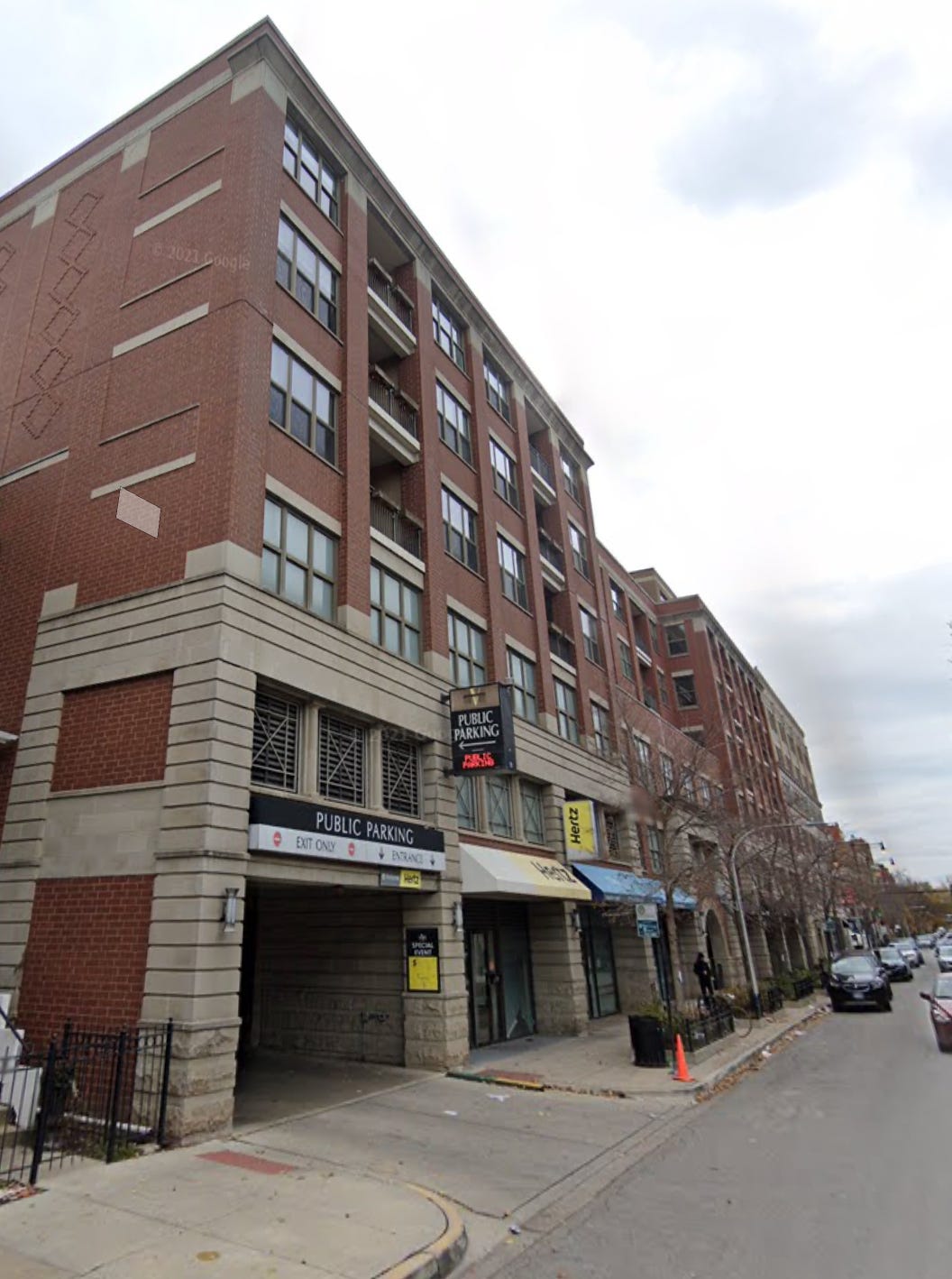
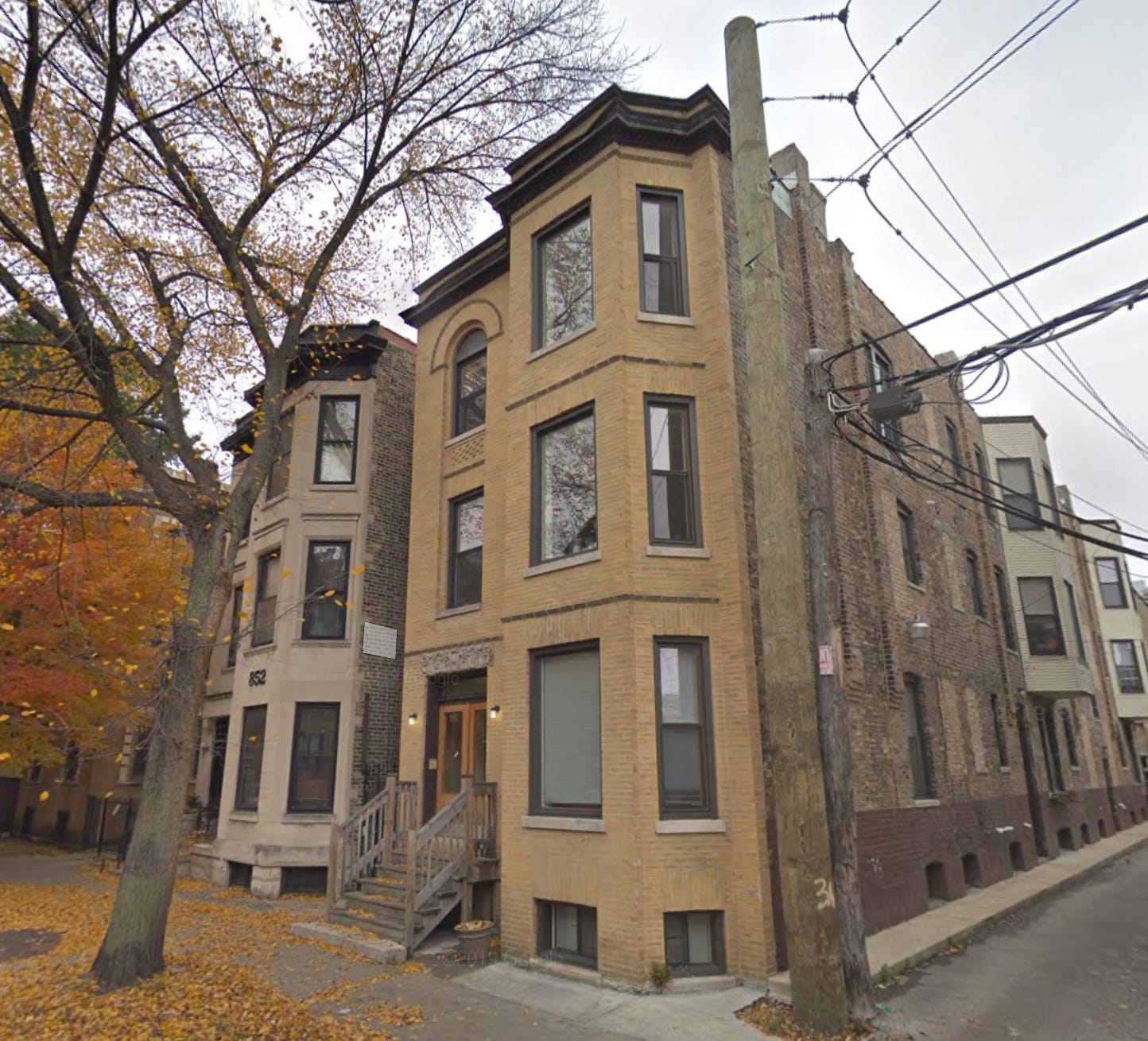













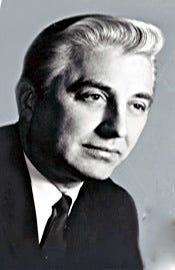



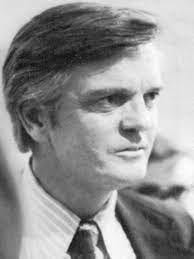





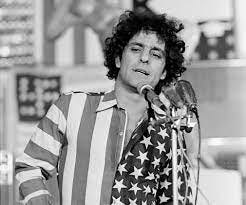

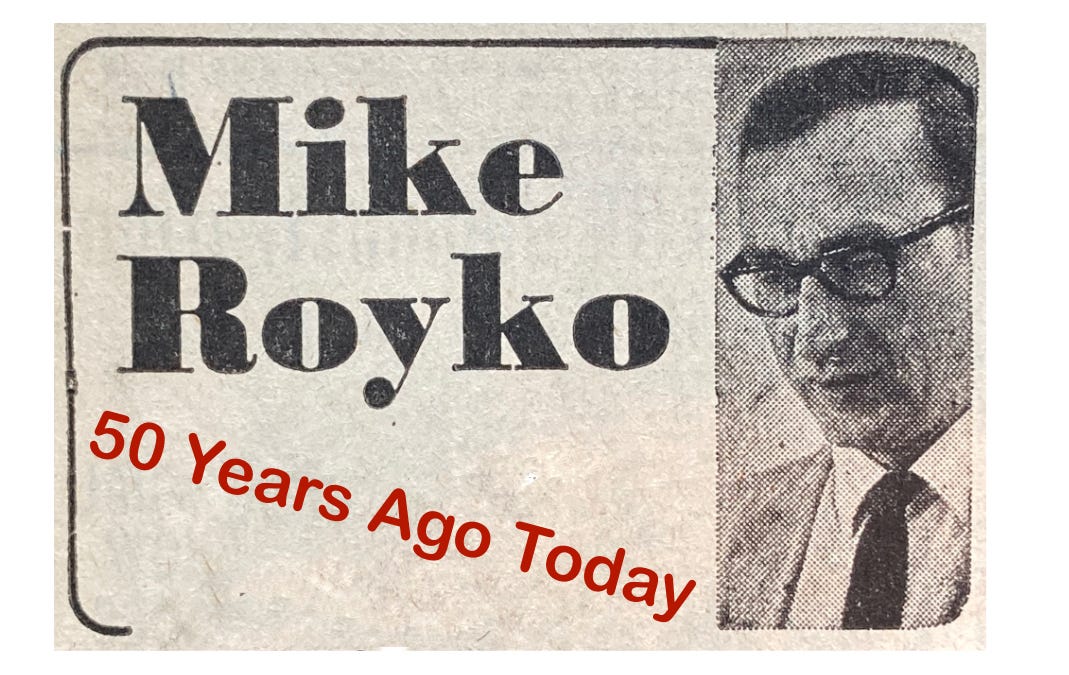











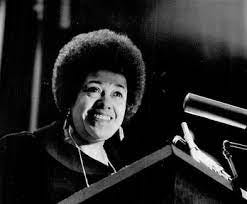

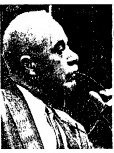

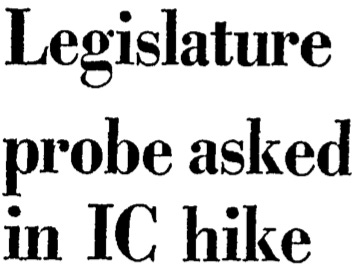



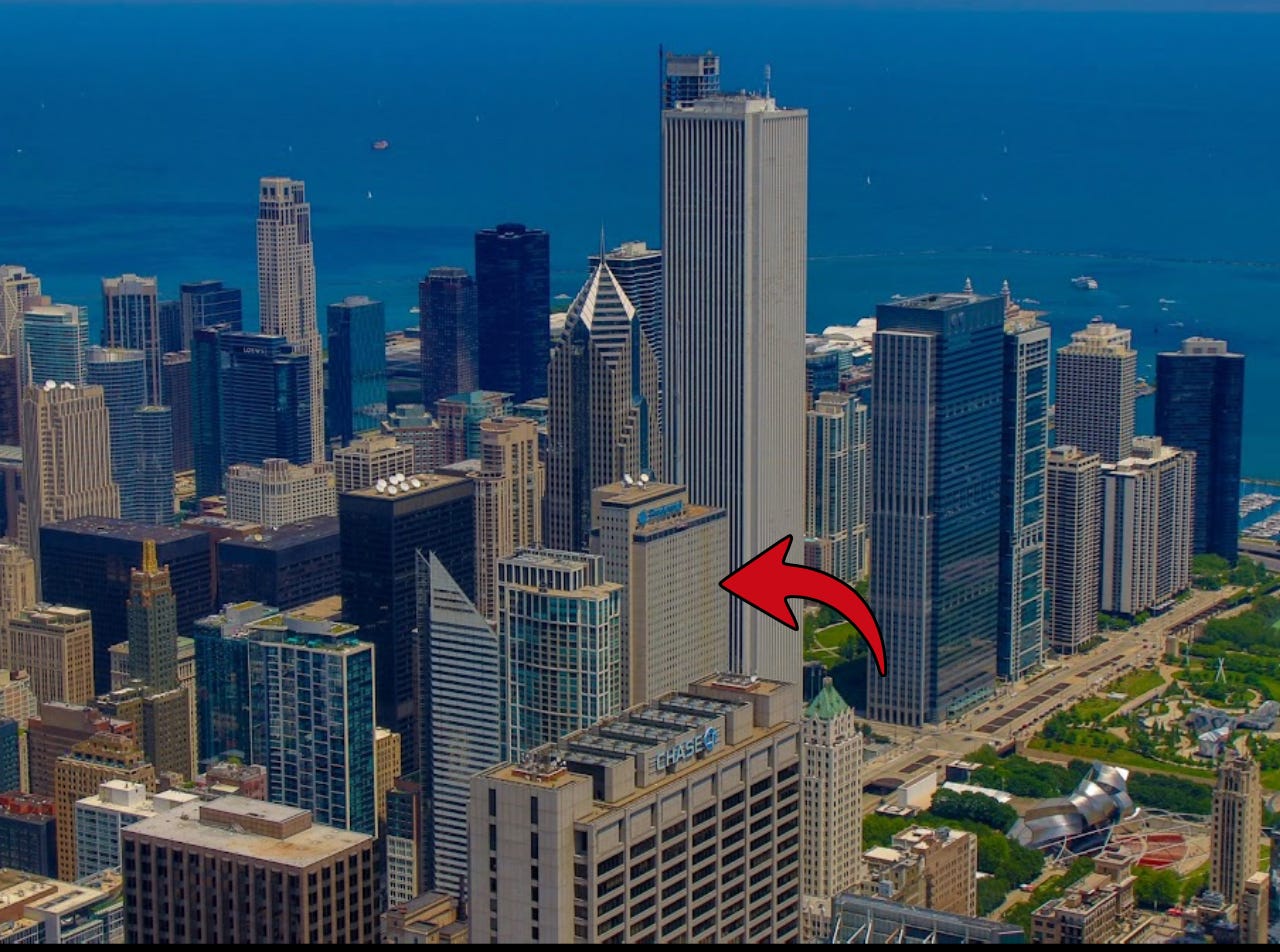


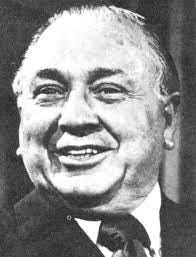



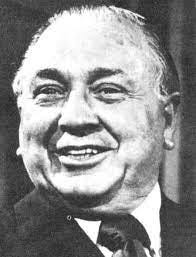


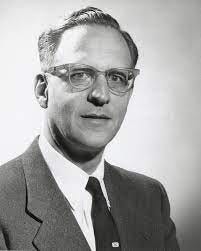
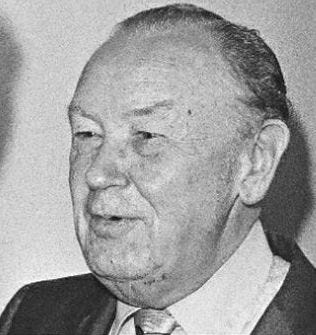
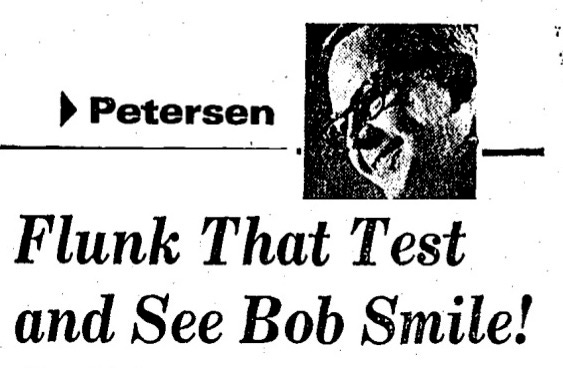




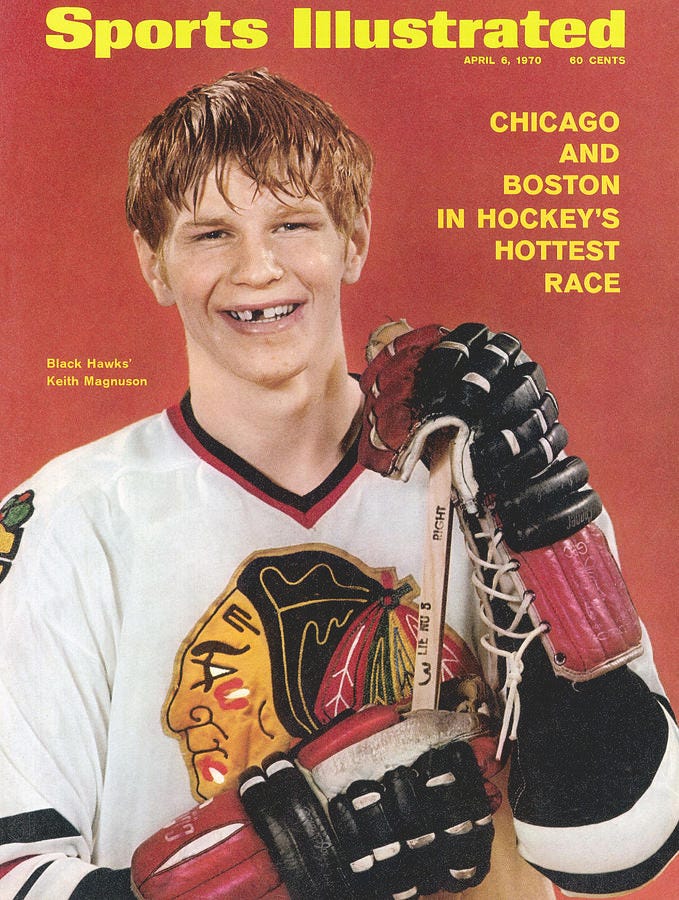

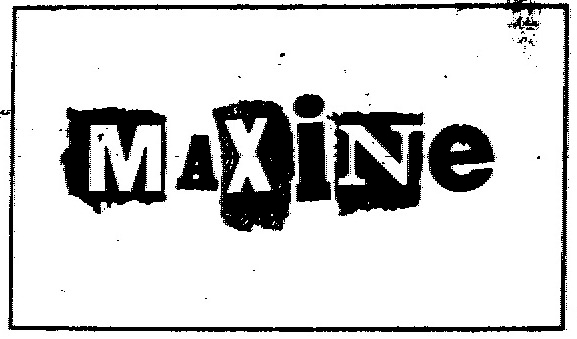






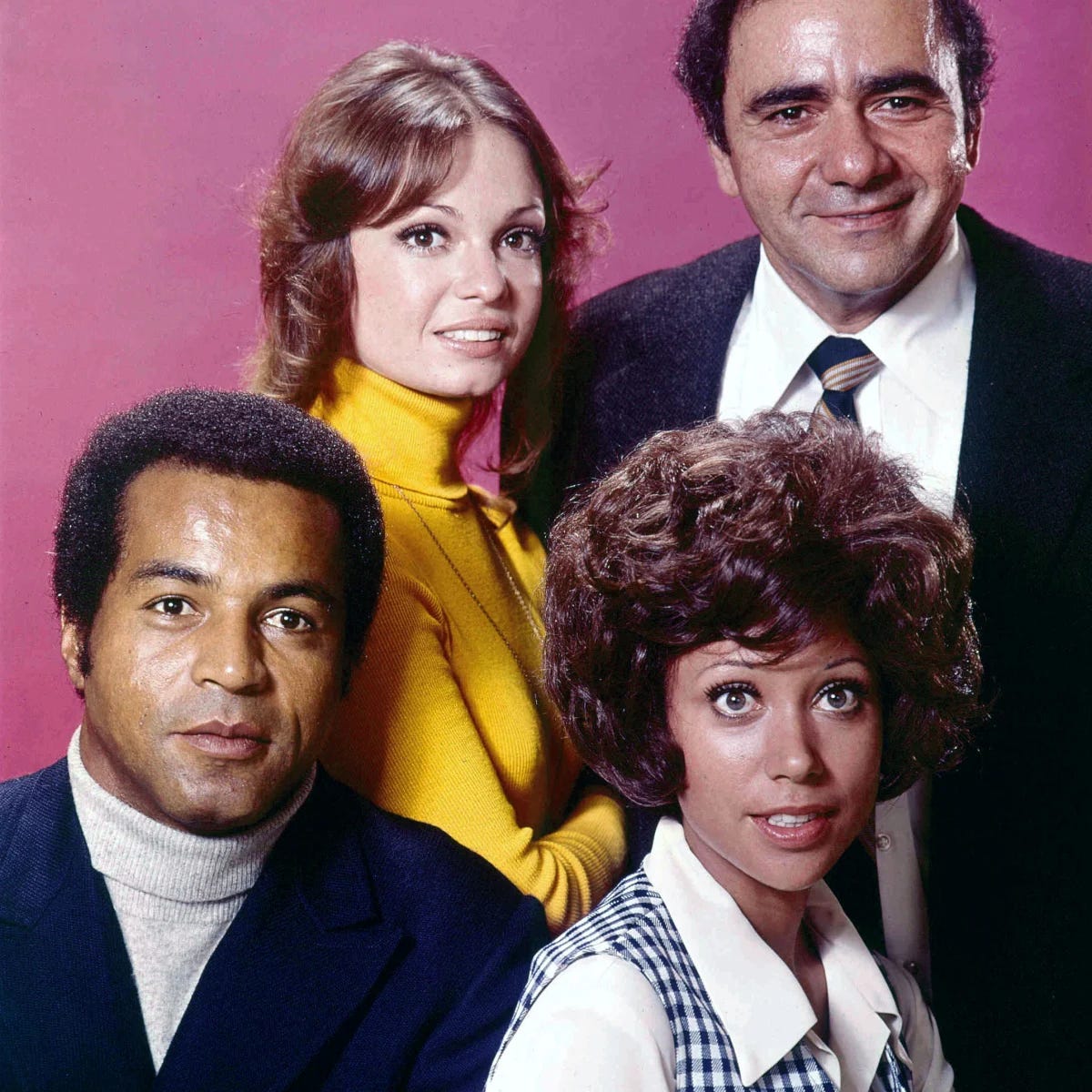
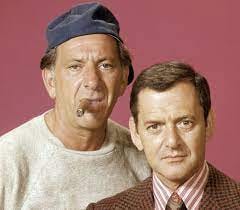


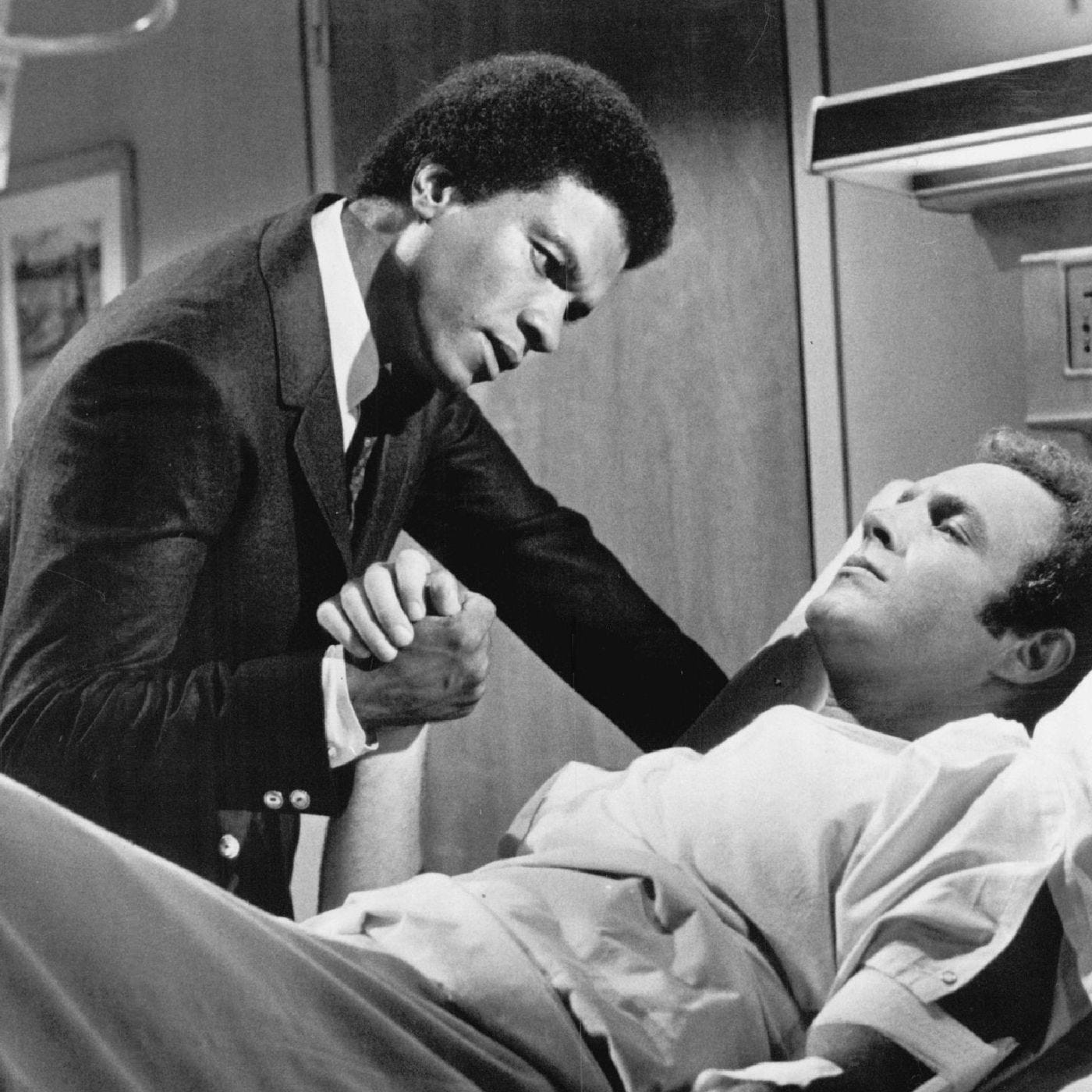



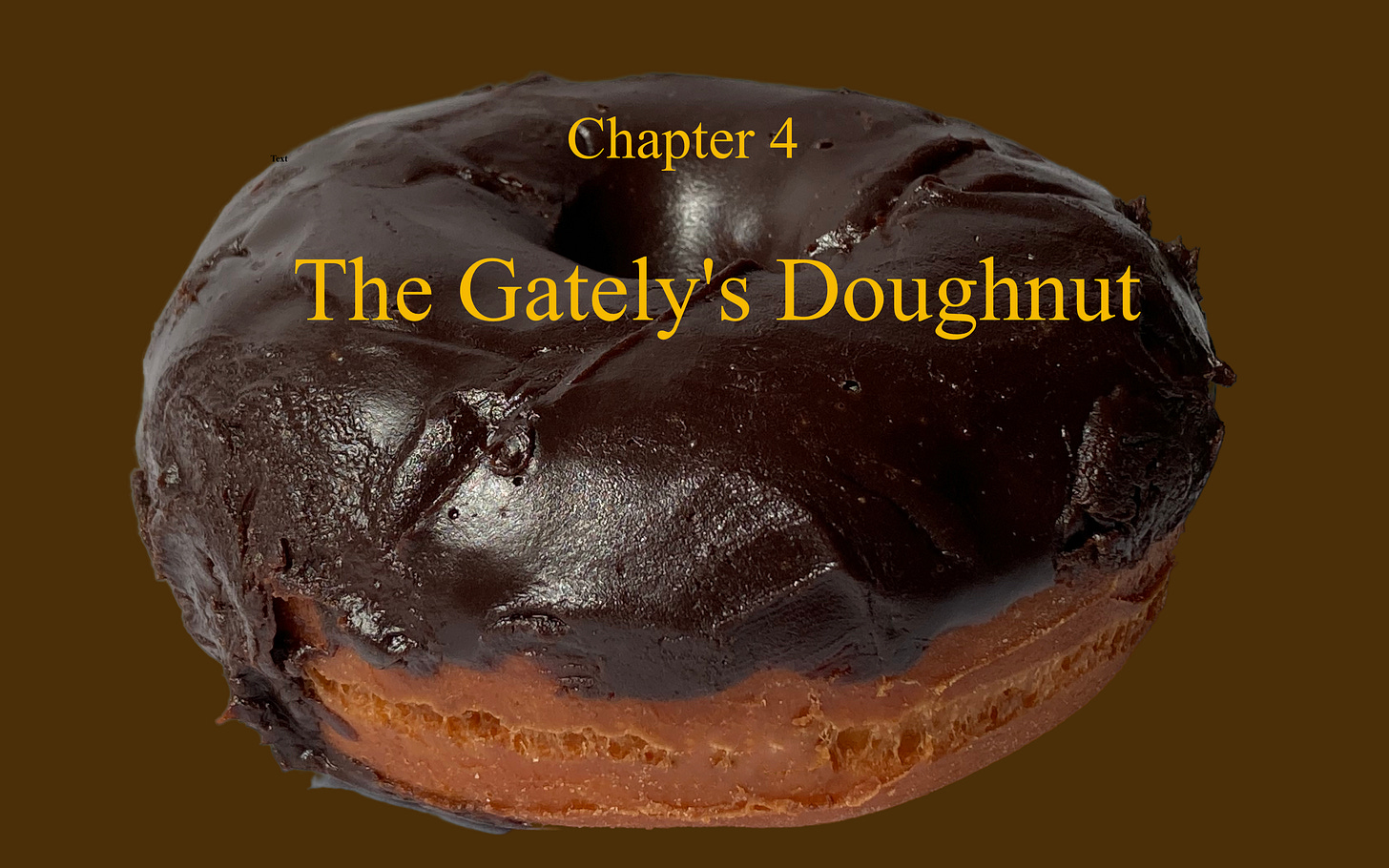

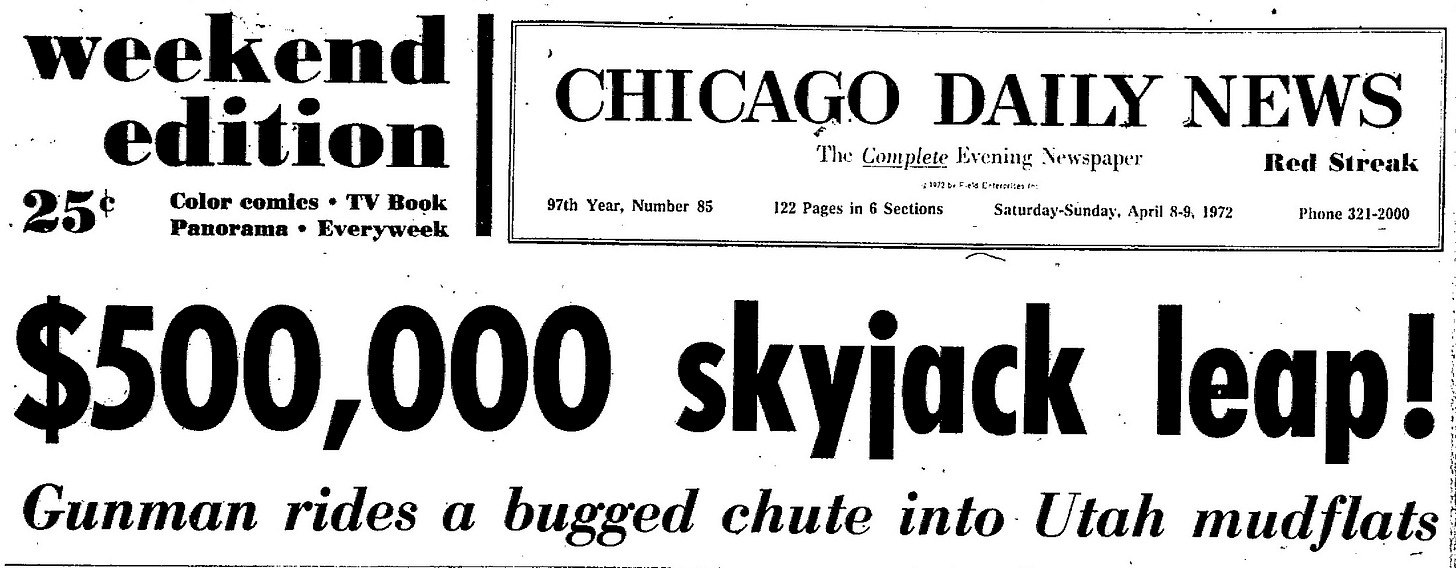





Thanks again for your work, always an interesting read. Look forward to the Father Dubi feature, he married a couple that I stood up for back in 1983. Also I'm betting that Cavanaugh's ended up in the old restaurant space, it was a pretty nice place to eat and drink. https://www.timeout.com/chicago/bars/cavanaughs-bar-restaurant